For anyone who has read my debut novel SIGN HERE, it should come as no surprise that I am a fan of dark humor. My mom is the funniest person I know and watching her, especially together with her three brothers, turned me to the dark side early on, and I never looked back. That’s the thing about dark humor. Few simply dabble in it. Either you are a dark humor person, like me and the rest of my family, or you’re not. And you can’t fake it.
While all humor has a punchline, dark humor comes with a one-two punch. The way your audience receives the first punch tells us everything, and usually goes one of three ways. Option A: shock, and then strict disapproval. If you are a dark humor person, this is a good sign to shut down shop. Finish your drink, apologize to the widow, and go home. Option B: concern, and then mollification. Your audience’s initial thoughts read as if projected on a jumbo screen: “oh shit, this person is crazy.” Then, if they decide you are safe enough, they laugh. Maybe just a polite “let me locate my exits” kind of laugh, or maybe something a bit too much, a laugh like clearing a pipe. So that you know they “get it.” But then there’s option C. This is the reaction a dark humor person is hoping for: Option C folks look at you, let whatever outrageous thing you just said hang in the air like mistletoe, and then smirk and give something equally outrageous back. That’s how you know you’ve been found.
As a woman who asks new house guests to introduce themselves to my father, whose ashes reside in a box on my mantle, dark humor is my whale song, how I find my pod. Trust me, not everyone is a fan. But the people who get it: the people who understand that humor resides in darkness as well as light, in sadness as well as joy, those are my people. And if you’re like me, then humor does not take away from hardness or undermine pain: it serves as a crucial utensil to consume grief or fear or humiliation piece by piece, lest it consumes us.
When I came extremely close to being consumed completely by loss, humor was my lifeline. My mother’s too. We laugh through the worst moments together, just as much as we fall apart. I consider it a hereditary superpower, a gift from my pod of origin. One I will take with me the rest of my life—and something I strove to share with others in SIGN HERE.
The following books are some of my favorites that capture this feeling. These writers put humor to work either to enrich the horror, promote character development or simply provide a full picture of life outside of the paddocks of genre. And I know, should I ever encounter any of these writers, they would hear my whale call. After all, it would be tuned just for them.
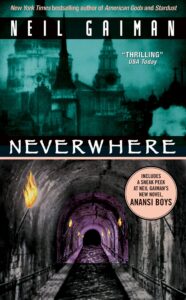
Neil Gaiman, Neverwhere
Neil Gaiman is famous for his incredible imagination and combination of humor and darkness. Neverwhere is the first book of his that I read, and one of the first times I saw that combination done so flawlessly. Richard Mayhew’s harrowing adventure in London Below involves violence and death and two of the creepiest/funniest bad guys I’ve ever read. While there are a lot of terrors in London Below, there are also a lot of hilarious, charming characters who guide Richard along his way and help him decide what kind of man he wants to be.
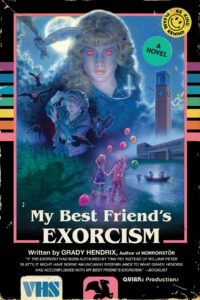
Grady Hendrix, My Best Friend’s Exorcism
Grady Hendrix is another giant of dark humor. While they all hit the mark, this novel is my favorite for the friendship. He does such a great job of not only writing something terrifying and laugh-out-loud funny, but also capturing the depth and significance of first friendship, especially between girls. The kind of commitment and love that comes from that connection, which feels strong enough to defeat whatever comes their way. The dialogue, music references and internal thoughts of these teenagers in the 80s delight the reader, while the gore and possession is sure to disgust (in a delightful way!).
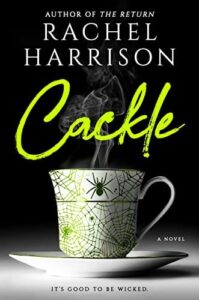
Rachel Harrison, Cackle
Rachel Harrison’s second novel had me laughing out loud as I walked my dog around my block with my headphones (thank you, Boston Public Library audiobook app!) and also stopping in my tracks to write down the lines that blew me away. This book is a great example of a twist on a classic horror narrative of the witch in the woods. But when I say “twist” I mean “twists” because they just keep coming, all the way until the very end. It’s a perfect blend of funny, scary, inspiring, and empowering, and I couldn’t recommend it enough.

Louise Penny, The Inspector Gamache Novels
These are straight up whodunit novels, with a brilliant detective and a small, sleepy town (with way too many murders to be so sleepy) at their center. The humor in these novels is all in the dialogue. The characters who live in Three Pines are the primary focus, and their relationships, friendships and banter thrive throughout the eighteen novels in the series. At this point, I’ve read enough of these that I know each character’s sense of humor, the way I do with my friends, which speaks to Louise Penny’s brilliant real-world-feel creation.

Chuck Palahniuk, Invisible Monsters
Chuck Palahniuk is a master of the unsound, and I credit him and his work for guiding me along the dark humor path from a young age. I chose Invisible Monsters because it was my favorite, but any of his books would fit this category. Invisible Monsters centers on the grotesque fixation on physical appearance and what it does to a person to be seen as disgusting. A common theme in horror, and in the minds of so many regular people. I read this book first in high school, when I was deep in my own twisted relationship with my body, fixated on the currency that is beauty. This book woke me up in a lot of ways, and also made me grimace-laugh the way only Palahniuk can.
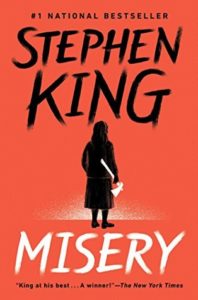
Stephen King, Misery
Similarly to Chuck Palahniuk, there are many novels by Stephen King that would fit this category. He is a genius of not only horror, but the role that humor can play to aid in said horror. But Misery is my all-time favorite. Not only because it is such a brilliant allegory for addiction and its impact on creativity, but because of Annie Wilkes. When your psychopathic captor uses phrases like “dirty birdy” and “cockadoodie” and admonishes you for cursing as she hacks you apart, it’s both humor and horror gold.
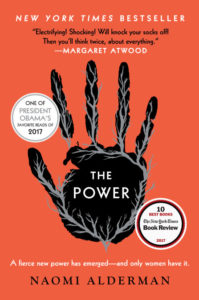
Naomi Alderman, The Power
This book lit up my insides with something akin to humor, but better. Glee. This smash hit from 2017 isn’t defined as horror, but it has the telltale components: half of the population suddenly gets a potentially violent superpower, and it throws the balance of power, and the world, into chaos. While there are some humor-forward characters, my glee came from the fact that the only people who received this mysterious, dangerous power were women. This novel felt like a balm for my soul. Do I wish I woke up with a power like this? No, of course not! (I mean…yes. Duh, yes.) But I haven’t, so the Power gave me the damn-near-giddy satisfaction of imagining if I could—if any of us could—how the world would look with the tables turned. It is a thrilling and absolutely delicious read, unless you’re afraid of women having power. In which case, I would skip this one (and also maybe procreation).
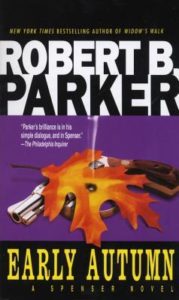
Robert B. Parker, The Spenser Novels
As a Bostonian, I would be doing my city a disservice if I didn’t include Parker’s Spenser novels on this list. Parker wrote forty novels following private investigator Spenser (no first name provided) on his adventures, which went on to influence Lee Child’s character Jack Reacher. Every plotline is different, but Spenser stays the same: sarcastic, smartass, always getting himself into trouble, but also equally able to—casually, almost begrudgingly—get himself out of it. I love a book (or series) where I really get to know the main character(s) and I freaking love Spenser. That dry Boston humor feels like home, as does his detailed description of, and commitment to, mealtime.
***


















